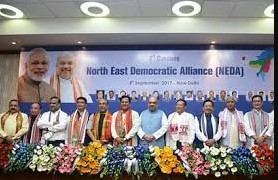World Education Congress 2023
June 13, 2025

The North-East Democratic Alliance (NEDA) is a political coalition formed in India to address the developmental and political concerns of the northeastern states. It was established on May 24, 2016, with the objective of bringing together regional parties and organizations to work towards the overall development of the region. NEDA has played a crucial role in reshaping the political landscape of Northeast India and promoting regional cooperation.
The formation of NEDA was spearheaded by the Bharatiya Janata Party (BJP), which is the ruling party at the national level in India. The BJP recognized the need for a united front in the northeast to counter the dominance of other regional parties and to address the unique challenges faced by the region, including issues related to infrastructure, connectivity, security, and economic development.
The alliance initially comprised political parties such as the Asom Gana Parishad (AGP) in Assam, the Naga People's Front (NPF) in Nagaland, the Sikkim Democratic Front (SDF) in Sikkim, and the Bodoland People's Front (BPF) in Assam. These parties shared common ideologies and goals with the BJP and sought to work together to advance the interests of the northeastern states.
NEDA aims to foster regional integration and cooperation among the northeastern states while preserving their distinct cultural identities and aspirations. The alliance recognizes the diversity of the region and aims to bring about a balanced and inclusive development that benefits all sections of society.
One of the key objectives of NEDA is to strengthen the political base of the BJP and its allies in the northeastern states. The BJP has made significant inroads into the region, and NEDA serves as a platform for coordination and collaboration among the member parties. Through NEDA, the BJP has been able to form governments in several northeastern states, including Assam, Manipur, Tripura, and Arunachal Pradesh.
NEDA also focuses on addressing the long-standing issues of insurgency and militancy in the region. The northeastern states have witnessed various separatist movements and armed conflicts over the years. The alliance aims to promote peace, stability, and security by addressing the root causes of these conflicts and engaging in dialogue with various stakeholders.
The alliance has also played a crucial role in facilitating connectivity and infrastructure development in the region. Northeast India has historically faced challenges in terms of connectivity with the rest of the country, as it is geographically isolated from the mainland. NEDA has advocated for improved transportation networks, including road, rail, and air connectivity, to promote trade, tourism, and economic development.
Furthermore, NEDA has emphasized the importance of harnessing the region's rich natural resources and promoting sustainable development. The northeastern states are endowed with abundant natural resources, including oil, natural gas, coal, and hydroelectric power potential. The alliance seeks to leverage these resources to drive economic growth and generate employment opportunities for the people of the region.
In addition to political and developmental objectives, NEDA also serves as a platform for cultural and social exchanges among the member states. The alliance recognizes the diverse cultural heritage of the region and seeks to promote cultural integration and understanding among the people.
Since its formation, NEDA has witnessed both successes and challenges. The alliance has been successful in expanding the BJP's presence in the northeast and forming governments in several states. It has also played a significant role in addressing some of the long-standing issues of the region, including insurgency and connectivity.
However, NEDA has also faced criticism from various quarters. Some argue that the alliance primarily serves the political interests of the BJP and that its policies and actions may not always align with the aspirations of the people of the region. There have been concerns regarding the impact of large-scale infrastructure projects on the environment and local communities.

June 13, 2025

June 13, 2025

June 13, 2025

June 13, 2025

June 13, 2025

June 13, 2025

June 13, 2025

June 13, 2025

June 13, 2025

June 13, 2025